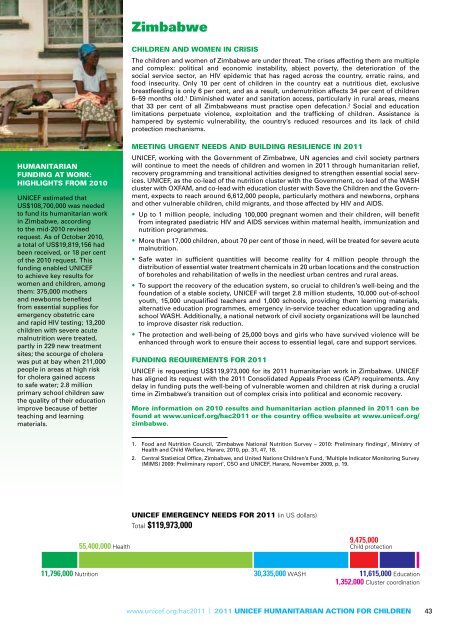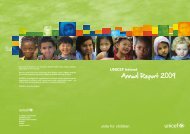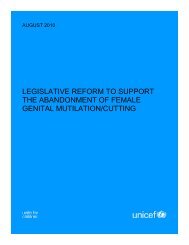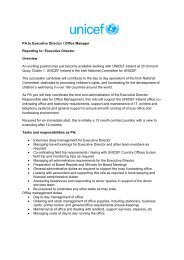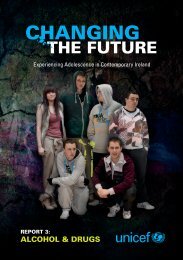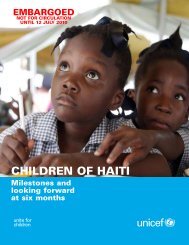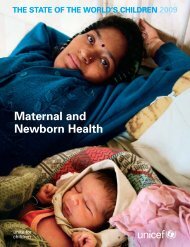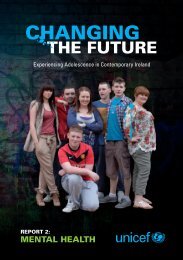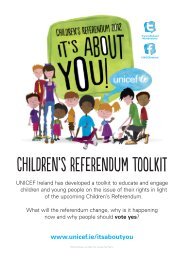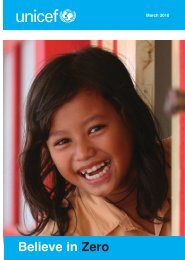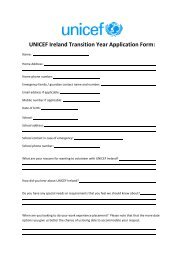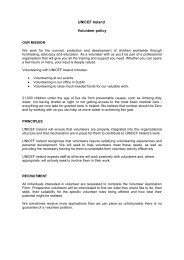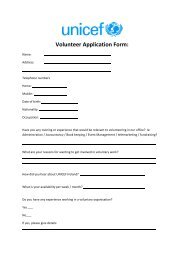Humanitarian Action for Children 2011 - Unicef
Humanitarian Action for Children 2011 - Unicef
Humanitarian Action for Children 2011 - Unicef
- No tags were found...
Create successful ePaper yourself
Turn your PDF publications into a flip-book with our unique Google optimized e-Paper software.
Zimbabwe<strong>Children</strong> and women in crisisThe children and women of Zimbabwe are under threat. The crises affecting them are multipleand complex: political and economic instability, abject poverty, the deterioration of thesocial service sector, an HIV epidemic that has raged across the country, erratic rains, andfood insecurity. Only 10 per cent of children in the country eat a nutritious diet, exclusivebreastfeeding is only 6 per cent, and as a result, undernutrition affects 34 per cent of children6–59 months old. 1 Diminished water and sanitation access, particularly in rural areas, meansthat 33 per cent of all Zimbabweans must practise open defecation. 2 Social and educationlimitations perpetuate violence, exploitation and the trafficking of children. Assistance ishampered by systemic vulnerability, the country’s reduced resources and its lack of childprotection mechanisms.<strong>Humanitarian</strong>funding at work:Highlights from 2010UNICEF estimated thatUS$108,700,000 was neededto fund its humanitarian workin Zimbabwe, accordingto the mid-2010 revisedrequest. As of October 2010,a total of US$19,819,156 hadbeen received, or 18 per centof the 2010 request. Thisfunding enabled UNICEFto achieve key results <strong>for</strong>women and children, amongthem: 375,000 mothersand newborns benefitedfrom essential supplies <strong>for</strong>emergency obstetric careand rapid HIV testing; 13,200children with severe acutemalnutrition were treated,partly in 229 new treatmentsites; the scourge of cholerawas put at bay when 211,000people in areas at high risk<strong>for</strong> cholera gained accessto safe water; 2.8 millionprimary school children sawthe quality of their educationimprove because of betterteaching and learningmaterials.Meeting urgent needs and building resilience in <strong>2011</strong>UNICEF, working with the Government of Zimbabwe, UN agencies and civil society partnerswill continue to meet the needs of children and women in <strong>2011</strong> through humanitarian relief,recovery programming and transitional activities designed to strengthen essential social services.UNICEF, as the co-lead of the nutrition cluster with the Government, co-lead of the WASHcluster with OXFAM, and co-lead with education cluster with Save the <strong>Children</strong> and the Government,expects to reach around 6,612,000 people, particularly mothers and newborns, orphansand other vulnerable children, child migrants, and those affected by HIV and AIDS.• Up to 1 million people, including 100,000 pregnant women and their children, will benefitfrom integrated paediatric HIV and AIDS services within maternal health, immunization andnutrition programmes.• More than 17,000 children, about 70 per cent of those in need, will be treated <strong>for</strong> severe acutemalnutrition.• Safe water in sufficient quantities will become reality <strong>for</strong> 4 million people through thedistribution of essential water treatment chemicals in 20 urban locations and the constructionof boreholes and rehabilitation of wells in the neediest urban centres and rural areas.• To support the recovery of the education system, so crucial to children’s well-being and thefoundation of a stable society, UNICEF will target 2.8 million students, 10,000 out-of-schoolyouth, 15,000 unqualified teachers and 1,000 schools, providing them learning materials,alternative education programmes, emergency in-service teacher education upgrading andschool WASH. Additionally, a national network of civil society organizations will be launchedto improve disaster risk reduction.• The protection and well-being of 25,000 boys and girls who have survived violence will beenhanced through work to ensure their access to essential legal, care and support services.Funding requirements <strong>for</strong> <strong>2011</strong>UNICEF is requesting US$119,973,000 <strong>for</strong> its <strong>2011</strong> humanitarian work in Zimbabwe. UNICEFhas aligned its request with the <strong>2011</strong> Consolidated Appeals Process (CAP) requirements. Anydelay in funding puts the well-being of vulnerable women and children at risk during a crucialtime in Zimbabwe’s transition out of complex crisis into political and economic recovery.More in<strong>for</strong>mation on 2010 results and humanitarian action planned in <strong>2011</strong> can befound at www.unicef.org/hac<strong>2011</strong> or the country office website at www.unicef.org/zimbabwe.1. Food and Nutrition Council, ‘Zimbabwe National Nutrition Survey – 2010: Preliminary findings’, Ministry ofHealth and Child Welfare, Harare, 2010, pp. 31, 47, 18.2. Central Statistical Office, Zimbabwe, and United Nations <strong>Children</strong>’s Fund, ‘Multiple Indicator Monitoring Survey(MIMS) 2009: Preliminary report’, CSO and UNICEF, Harare, November 2009, p. 19.UNICEF EMERGENCY NEEDS FOR <strong>2011</strong> (in US dollars)Total $119,973,00055,400,000 Health9,475,000Child protection11,796,000 Nutrition30,335,000 WASH11,615,000 Education1,352,000 Cluster coordinationZimbabwewww.unicef.org/hac<strong>2011</strong> | <strong>2011</strong> UNICEF <strong>Humanitarian</strong> <strong>Action</strong> FOR CHILDREN 43


